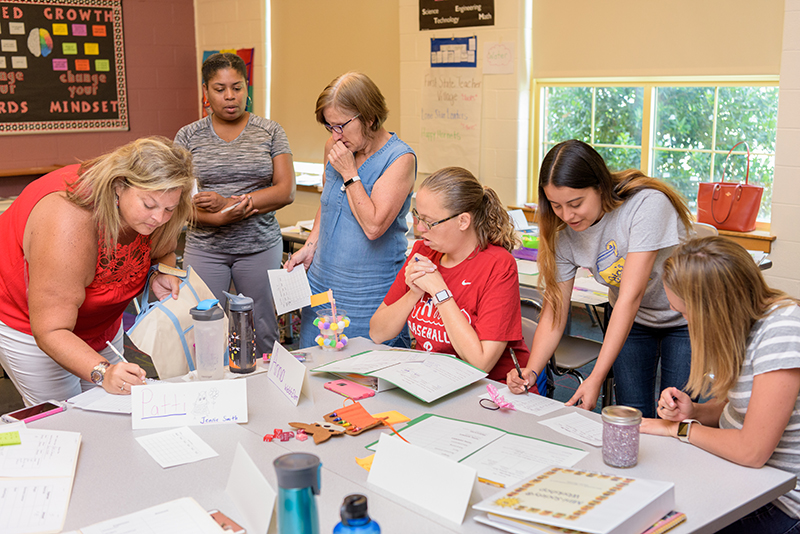


Mini-Society training
Photo by Evan Krape August 17, 2017
Teachers learn how to implement Mini-Society unit for young students
Suppose your neighborhood had one popcorn store, and then a few others began to open in the same location. What would that mean for popcorn prices? What would that mean for the different types of popcorn offered?
Faculty members from the University of Delaware’s Center for Economic Education and Entrepreneurship (CEEE) help area teachers explore questions such as these in their classrooms through the Mini-Society program. This self-organizing, experience-based approach to instructing students includes lessons on entrepreneurship, economics, government, career opportunity, consumer issues and values.
Through Mini-Society, created by former UCLA professor Marilyn L. Kourilsky, young students explore the roles of civil servants, entrepreneurs and consumers, and open their own businesses for shoppers on Market Days. They explore economic concepts such as supply and demand, goods and services, and the monetary system.
Each summer, the CEEE offers an intensive training so that teachers new to the program are fully prepared to instruct in the curriculum. Through three days of professional development, these teachers learn to serve as facilitators so that their students, through trial and error, can learn basic economic concepts while creating their own micro-economy in the classroom.
Bonnie Meszaros, associate director of CEEE and instructor for Mini-Society, discussed how important it is for students to participate in Mini-Society and how the skills learned during the program will apply in many different aspects of their education.
“Mini-Society focuses on economic and entrepreneurship content,” Meszaros said. “But in the process, students develop problem-solving and critical thinking skills that carry over throughout their school years.”
Erin Boettcher, a teacher at Wilbur Elementary school and graduate of the CEEE’s Master of Arts in Economics & Entrepreneurship for Educators (MAEEE) program, has been implementing Mini-Society in her own classroom since 2005. She now instructs teachers on Mini-Society with Meszaros and said she believes teachers benefit as well as students when they implement the program at their own schools.
“Our hope for the teachers is that they learn economic concepts and in turn feel confident to share them with their students.” Boettcher said. “The teachers actually go through the entire process that the students do. They need to problem solve, make short- and long-term decisions and apply the economic concepts to their business.”
Heather Brooks, a library and reading teacher for grades one through four at The Tatnall School, said she loves the way her students can use all of the subjects they’re learning in school and apply them during Mini-Society.
“I love that the Mini-Society unit uses reading, writing, math and social studies.” Brooks said. “It is truly an integrated unit, so I can touch on a lot of important skills while the students just think they are having fun.”
Brooks added that students learn important lessons that will carry them through college with Mini-Society, as the integrated structure of Mini-Society teaches students both important financial lessons and personal lessons.
Meszaros said students can apply these lessons to real-life problems.
“This is a perfect time to teach students about competition,” Meszaros said. “All the lessons that reinforce this concept use active learning strategies that not only engage the students but also help them transfer what they have learned to the real world.”
Boettcher added, “Today, we need our students to be problem solvers, to think outside of the box to come up with new, innovative ideas, and Mini-Society offers them an opportunity to do that. Additionally, it requires them to think critically, persevere through challenges and reflect and make changes to their business. These are skills necessary to be successful through high school and beyond.”
Contact Us
Have a UDaily story idea?
Contact us at ocm@udel.edu
Members of the press
Contact us at 302-831-NEWS or visit the Media Relations website

